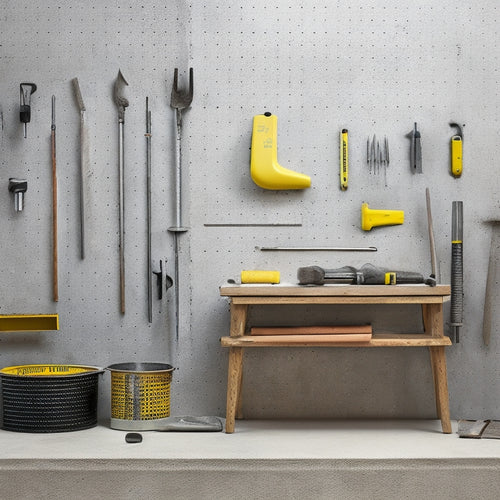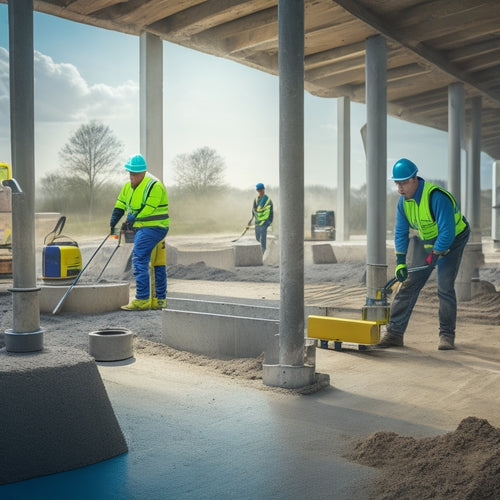
Smart Guide to Buying Used Concrete Hand Tools
Share
You're about to buy used concrete hand tools, and you need to get it right. Dedicate time to identify the tools you need, then scour online marketplaces like eBay and Facebook Marketplace for deals. Research sellers' credentials, ratings, and feedback to guarantee you're buying from a trustworthy source. Carefully inspect tool condition through high-quality photos, and research market value to inform your negotiation strategy. Don't forget to clarify return policies and verify tool authenticity to avoid buying counterfeit or low-quality tools. By following these steps, you'll be well on your way to making a smart purchase, and there's more to uncover to guarantee you get the best deal possible.
Key Takeaways
- Research and identify the tools you need, and compare prices on online platforms to find the best deals.
- Verify the seller's authenticity and reliability through customer feedback, ratings, and business credentials.
- Inspect tool condition by reviewing high-quality photos and checking for signs of wear, rust, or corrosion.
- Negotiate prices by researching market value, considering seasonal demand, and starting with a lower offer.
- Clarify return policies and understand the return window, conditions, refund policy, and required documentation.
Researching Online Marketplaces
How much time and effort are you willing to dedicate to finding the perfect used concrete hand tools online?
You'll need to invest some time in researching online marketplaces to get the best deals. Start by making a list of potential tools you need, and then head to online marketplaces like eBay, Craigslist, or Facebook Marketplace.
Next, practice comparison shopping to find the best prices. Look for tools with similar specifications and compare their prices across different marketplaces.
Be sure to factor in shipping costs and any additional fees. User reviews are also vital in your research. Pay attention to the seller's ratings and read reviews from previous buyers to get an idea of the tool's condition and the seller's reliability.
Identifying Reputable Sellers
When buying used concrete hand tools, you need to identify reputable sellers to guarantee you're getting quality tools and avoiding scams.
You'll want to verify the seller's authenticity, check their business credentials online, and look for verified marketplace sellers who've a proven track record.
Authentic Seller Verification
Trust is a fragile commodity in the world of used concrete hand tools, and it's the skeptical buyer who ultimately comes out on top. You can't afford to take a seller's word for granted, no matter how convincing they may seem.
To verify you're dealing with a reputable seller, start by asking for references from previous customers. This will give you an idea of their seller reputation and whether they've delivered on their promises in the past.
Also, check if the seller offers any kind of buyer protection. Do they've a return policy in place? Are they willing to provide a warranty or guarantee for their tools?
If they're hesitant to provide any of these assurances, it's best to walk away. A reputable seller will always prioritize transparency and customer satisfaction.
Check Business Credentials Online
You've already taken a significant step in verifying a seller's authenticity by asking for references and checking their buyer protection policies.
Now, it's time to dig deeper and check their business credentials online. This will give you a better understanding of their online reputation and help you identify red flags.
Start by searching for the seller's business name online, along with keywords like "reviews" or "complaints." This should bring up a list of websites that feature customer feedback, such as Yelp, Google Reviews, or the Better Business Bureau.
Take note of the overall rating and read through the comments to get a sense of the seller's strengths and weaknesses. Be wary of sellers with low ratings or multiple complaints.
You can also check websites like Trustpilot or Sitejabber, which specialize in reviewing online businesses.
These sites can give you a more thorough view of the seller's online reputation. By doing your due diligence, you'll be better equipped to make an informed decision about whether to trust the seller with your business.
Verified Marketplace Sellers
Many online marketplaces, such as eBay, Amazon, or specialized construction equipment platforms, offer verification processes to help identify reputable sellers.
When buying used concrete hand tools online, it's vital to take advantage of these processes to guarantee you're dealing with a trustworthy seller.
Look for sellers with:
- Verified badges or icons next to their username, indicating they've completed the marketplace's verification process
- High seller ratings (95% or above) based on customer feedback, which indicates a track record of successful transactions and happy customers
- Detailed customer feedback that provides specific information about the seller's communication, shipping, and product quality
Inspecting Tool Condition Online
When browsing online marketplaces for used concrete hand tools, five minutes of due diligence can save you from a costly mistake. You need to inspect the tool condition online before making a purchase. Look for high-quality photos of the tool from multiple angles. Check for any signs of rust, corrosion, or wear on moving parts. Read the description carefully and ask the seller questions if you're unsure about anything.
Here's a checklist to follow:
| Tool Part | Online Inspection Technique | Tool Maintenance Tip |
|---|---|---|
| Handles | Check for cracks, splinters, or worn grips | Regularly clean and dry handles to prevent damage |
| Blades | Inspect for rust, corrosion, or bent edges | Store blades in a dry place and apply rust-inhibiting coating |
| Moving Parts | Look for signs of wear, rust, or corrosion | Regularly lubricate moving parts to prevent wear |
| Electrical Components | Check for frayed cords, exposed wires, or broken plugs | Avoid exposing electrical components to water or moisture |
| Overall Condition | Check for any signs of misuse, abuse, or neglect | Regularly inspect tools for signs of wear and tear |
Negotiating Prices Effectively
You've found a used concrete hand tool that fits your needs, now it's time to negotiate the price.
To do this effectively, you'll need to know the market value of the tool, so research what similar tools are selling for online.
With that knowledge, you can make an informed offer that's likely to be accepted.
Know the Market
Since you've set your sights on buying used concrete hand tools, it's essential to know the market to negotiate prices effectively. You need to understand the current market trends and pricing fluctuations to make informed decisions. This knowledge will give you an edge when negotiating with sellers, allowing you to get the best deals.
To get a sense of the market, research online marketplaces, such as eBay and Craigslist, to see what similar tools are selling for. You can also visit local hardware stores and construction sites to get a feel for the demand and prices of used concrete hand tools.
Some key things to keep in mind:
-
Seasonal demand: Prices may fluctuate based on the time of year and construction seasons.
-
Tool condition: The condition of the tool greatly affects its price, so be prepared to negotiate based on the tool's condition.
-
Comparable sales: Look for similar tools that have recently sold to determine a fair price range.
Make an Offer
Now that you've got a sense of the market, it's time to put your knowledge to the test. You've researched the prices, and you're confident in your budget. It's time to make an offer on that used concrete hand tool you need.
When negotiating, remember that pricing strategies aren't set in stone. Be prepared to walk away if the seller is unwilling to budge. This tactic shows you're not desperate, and it often prompts the seller to reconsider their price.
Start with a lower offer than you're willing to pay, and be ready to compromise. Keep in mind that the initial price is rarely the final price.
As a savvy buyer, you should employ buyer tactics like asking about any defects or needed repairs. This can give you an advantage to negotiate a better price.
Additionally, inquire about any additional costs, such as shipping or taxes, to avoid surprise fees. Stay calm, be respectful, and don't be afraid to counteroffer.
With persistence and the right strategy, you can get the tool you need at a price that fits your budget.
Understanding Return Policies
When purchasing used concrete hand tools, it's essential to hammer out the return policy details with the seller beforehand, as it can be a real deal-breaker if you're not satisfied with the tools' condition.
You don't want to end up stuck with a faulty tool that you can't return or exchange. Understanding the return policy will give you buyer protection and peace of mind.
Here's what you need to take into account:
-
Return window: How many days do you have to return the tool if you're not satisfied? Is it 30 days, 60 days, or something else?
-
Return conditions: What condition does the tool need to be in to qualify for a return? Does it need to be in its original packaging, or can you return it even if you've used it?
-
Refund policy: Will you get a full refund, or will there be restocking fees or other charges deducted from your refund?
Verifying Tool Authenticity
Before making a purchase, guarantee the used concrete hand tools you're buying are genuine products from reputable manufacturers. Counterfeit tools can be dangerous, ineffective, and even illegal.
To verify authenticity, start by researching the tool brands you're interested in. Look for official websites, social media, and authorized dealers to get a sense of what their products look like, including packaging, labels, and logos.
When inspecting the tools, check for any signs of tampering, alterations, or low-quality materials. Be wary of extremely low prices or deals that seem too good to be true. Legitimate sellers should be able to provide authenticity certificates or documentation from the manufacturer.
Don't be afraid to ask questions or request proof of authenticity. Additionally, inspect the tools for any certification marks from organizations like UL (Underwriters Laboratories) or CE (Conformité Européene).
Frequently Asked Questions
Can I Trust a Seller With No Ratings or Reviews?
You're right to question a seller with no ratings or reviews - it's tough to gauge their credibility. Evaluating quality is essential; look for detailed descriptions, clear photos, and a responsive seller to help you make an informed decision.
How Do I Handle International Shipping and Customs?
Can you really afford to overlook international shipping and customs subtleties? You'll need to research shipping regulations and customs procedures for both your country and the seller's to avoid surprise costs and delays.
Are Used Concrete Hand Tools Eligible for Manufacturer Warranties?
When buying used concrete hand tools, you'll likely find that manufacturer warranties are void or hard to transfer, but it's worth checking; tool condition and age will impact warranty transferability, so inspect carefully and negotiate accordingly.
Can I Return a Tool if It Doesn't Fit My Specific Needs?
Before buying, you'll want to check the seller's return policy; if a tool doesn't fit your specific needs, you'll need to know if you can return it. Make certain you understand tool compatibility to avoid costly mistakes.
Are There Any Safety Concerns With Buying Used Hand Tools?
When buying used hand tools, you're risking compromised safety features, so inspect the tool condition carefully; look for signs of wear, damage, or tampering, and test them before use to verify your safety on the job site.
Conclusion
You've maneuvered the concrete jungle of used hand tools, and now you're ready to strike a deal. Remember, a smart buyer is a savvy buyer. With research, inspection, and negotiation, you've got the upper hand. Don't let uncertainty crack your confidence - you've got this. Seal the deal, and watch your toolbox change into a powerhouse of productivity. Your wallet (and your projects) will thank you.
Related Posts
-

10 Must-Have Tools for Concrete Repair Organization
You'll need a solid organization system to keep your concrete repair tools and materials within easy reach, protected...
-

Essential Tools for Epoxy Concrete Floor Repair
You'll need a thorough arsenal of specialized tools to guarantee a successful epoxy concrete floor repair. Floor prep...
-

What Tools Ensure Precise Concrete Leveling Results
You need a range of specialized tools to achieve precise concrete leveling results. Laser leveling instruments provid...


